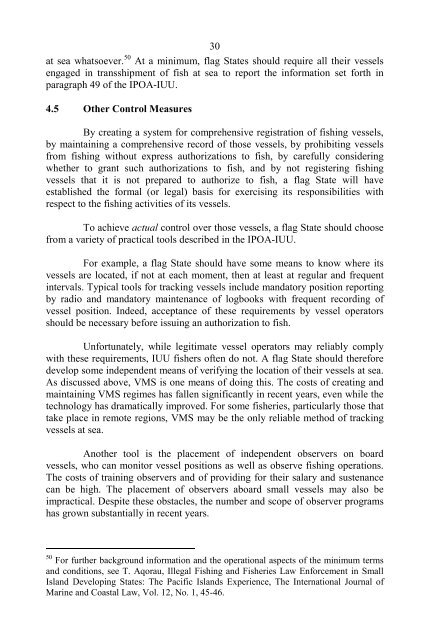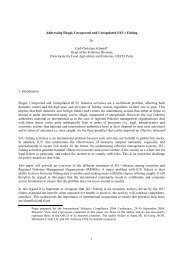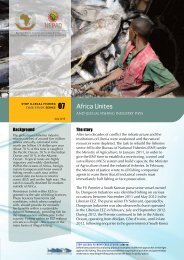Implementation of IPOA/IUU - International MCS Network
Implementation of IPOA/IUU - International MCS Network
Implementation of IPOA/IUU - International MCS Network
You also want an ePaper? Increase the reach of your titles
YUMPU automatically turns print PDFs into web optimized ePapers that Google loves.
30at sea whatsoever. 50 At a minimum, flag States should require all their vesselsengaged in transshipment <strong>of</strong> fish at sea to report the information set forth inparagraph 49 <strong>of</strong> the <strong>IPOA</strong>-<strong>IUU</strong>.4.5 Other Control MeasuresBy creating a system for comprehensive registration <strong>of</strong> fishing vessels,by maintaining a comprehensive record <strong>of</strong> those vessels, by prohibiting vesselsfrom fishing without express authorizations to fish, by carefully consideringwhether to grant such authorizations to fish, and by not registering fishingvessels that it is not prepared to authorize to fish, a flag State will haveestablished the formal (or legal) basis for exercising its responsibilities withrespect to the fishing activities <strong>of</strong> its vessels.To achieve actual control over those vessels, a flag State should choosefrom a variety <strong>of</strong> practical tools described in the <strong>IPOA</strong>-<strong>IUU</strong>.For example, a flag State should have some means to know where itsvessels are located, if not at each moment, then at least at regular and frequentintervals. Typical tools for tracking vessels include mandatory position reportingby radio and mandatory maintenance <strong>of</strong> logbooks with frequent recording <strong>of</strong>vessel position. Indeed, acceptance <strong>of</strong> these requirements by vessel operatorsshould be necessary before issuing an authorization to fish.Unfortunately, while legitimate vessel operators may reliably complywith these requirements, <strong>IUU</strong> fishers <strong>of</strong>ten do not. A flag State should thereforedevelop some independent means <strong>of</strong> verifying the location <strong>of</strong> their vessels at sea.As discussed above, VMS is one means <strong>of</strong> doing this. The costs <strong>of</strong> creating andmaintaining VMS regimes has fallen significantly in recent years, even while thetechnology has dramatically improved. For some fisheries, particularly those thattake place in remote regions, VMS may be the only reliable method <strong>of</strong> trackingvessels at sea.Another tool is the placement <strong>of</strong> independent observers on boardvessels, who can monitor vessel positions as well as observe fishing operations.The costs <strong>of</strong> training observers and <strong>of</strong> providing for their salary and sustenancecan be high. The placement <strong>of</strong> observers aboard small vessels may also beimpractical. Despite these obstacles, the number and scope <strong>of</strong> observer programshas grown substantially in recent years.50 For further background information and the operational aspects <strong>of</strong> the minimum termsand conditions, see T. Aqorau, Illegal Fishing and Fisheries Law Enforcement in SmallIsland Developing States: The Pacific Islands Experience, The <strong>International</strong> Journal <strong>of</strong>Marine and Coastal Law, Vol. 12, No. 1, 45-46.
















